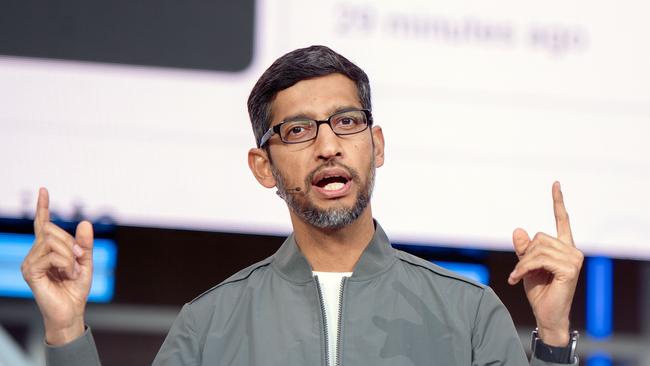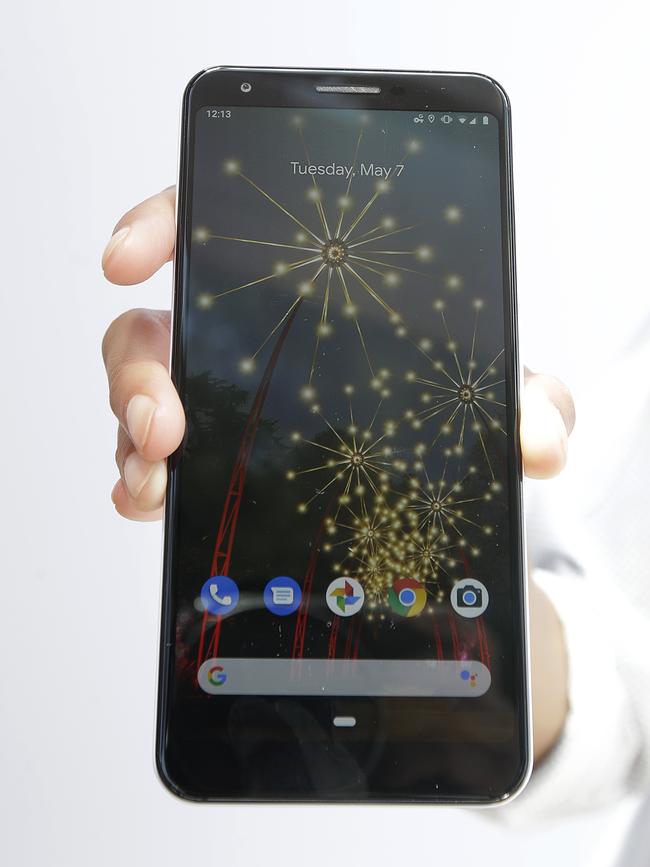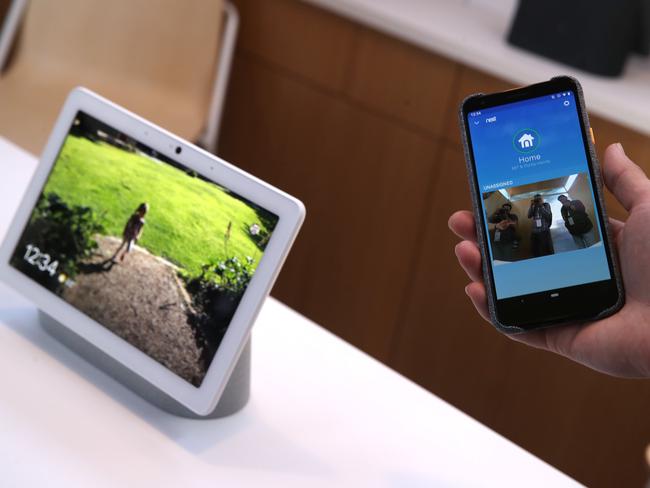Google pledges to keep secrets
Google has made some concessions to users on privacy while releasing a raft of new toys.

Google is offering to give up some data collection capability to address concern about user privacy — the tech giant’s most significant response to global concerns about the vast amount of personal data it vacuums up.
Yesterday’s announcement was the biggest takeout at the Google I/O developers conference in California.
Gone are the days when new hardware hogged the headlines — not that the three-day conference lacks new toys.
Google unveiled two new Pixel phones. The Pixel 3a and 3a XL offer most of the high-end camera features of last year’s premium Pixel 3 at half the price. In Australia they will sell for $649 and $799 respectively.
The new Android Q Beta software that comes with the phone offers directions by showing you virtual arrows and other helpful symbols when you look through the display.
There’s also the Nest Hub Max, a Google Home device with a 10-inch screen and a camera with a 127-degree field of view that Google thinks will transform kitchens.
But privacy has been Google’s achilles heel. The deal is that we give Google access to our data, such as the websites and locations we visit, in return for using its software and services for free.
Google has been forced to improve privacy options. Whether the response amounts to much is open to conjecture. Privacy and security settings have already been consolidated into one place and Google says they’ll be easier to access. You’ll be able to tap your profile photo to change them.
Recently announced auto-delete controls will let you specify whether you want your personal data deleted after three or 18 months. This will happen automatically. It’s available for web data now and will work for location data in coming weeks.

The incognito mode of Google Chrome, where your browser history isn’t recorded, will be extended to Maps, Search and YouTube. When you go incognito, Google will no longer record your location in Maps and your search results won’t be collected, nor will your choice of YouTube videos and movies.
Some will say these measures don’t amount to much. Google may not record your search history but will third parties collect it though their cookies? Some experts suggest more than 130 third-party trackers can glean content from a single website.
Can you trust your Android phone not to record your location? Again, it’s a matter of conjecture. The Australian recently reported research that claimed Android phones were recording your location about 14 times an hour, even when you were asleep. Nevertheless, it’s a step in the right direction. Wise heads at Google believe forgoing some data in the name of user privacy won’t break the business model, given the huge volume of information collected.
Android phones also are offering two-step verification that lets you sign in with a tap. The measure will be available from today to more than one billion devices.

Google also has announced live captioning, which adds captions to videos and movies in real time that haven’t been captioned before. Those who are hearing-impaired can participate in video calls, and you can watch and understand films without annoying other people when you travel by bus or train. Google showcased the example of a deaf woman communicating during a call. The receiver’s words were translated to text as a messages and she used Google smart replies to quickly respond.
Voice recognition is being extended to those with slurred speech and those with diseases such as motor neurone disease, who are forced to communicate using their eyes or facial muscles.
It’s a new initiative called Project Euphoria that uses machine learning in each situation.
Google chief executive Sundar Pichai says this feature will come to Google Assistant in future but its model needs many more samples of people with slurred or hard to understand speech for training.
Changes are also afoot in Google News in Search.
The “full coverage” feature in the Google News app that shows supplementary stories will be brought to Search in the browser.
If you search for a black hole, machine learning will return different types of stories from a wide variety of sources. It could be about how the black hole got its name or a timeline. It will be implemented later this year.
Google also will start indexing podcasts this year.
Users can search for podcasts based on their content, not just their title, and search results will include 3-D models.
Human anatomy students who search for muscle flexion will be able to view a 3-D model of the human body from the search results and place the image in their own environment as an augmented reality object.
Google Lens, which intelligently interprets an image on your phone’s display and returns text details from it, is having its features extended. When the display shows a restaurant menu, Google Lens can highlight the popular dishes based on past selections.
Tap on a dish and you can see what it looks like. Point the camera at a receipt in a restaurant, and Lens can calculate the tip and split the bill. Point the camera at a recipe and a photo of the dish comes alive. Google is working with partners on these features.
In developing countries with phones that use the entry-level Google Go operating system, you can point at a sign, which will be read to you in your own language. It is being tested in India by people wanting to understand the instructions on packets of food, often in foreign languages.
Google also announced developments with Duplex, its new assistant that it showcased a year ago. A bot could call on your behalf to make a hairdressing or restaurant appointment.
Now it is being applied to car rental bookings in the US. However, instead of making calls, bot communications is by text messages. So far it has been rolled out to 44 US states.
There’s no suggestion of Australian availability at this stage.
Perhaps the biggest breakthrough is Google’s ability to implement AI processing on phones directly rather than through the cloud. At the conference it showed how Google Assistant’s ability to respond to requests speeded up enormously when processing was done directly on the phone.
It also means Google Assistant can work when the phone is offline or in Airplane mode.
The breakthrough involved compressing 100 Gigabytes of information in the cloud to 0.5GB of data on your phone.
This next-generation Google Assistant will come to Pixel phones later this year.
Google also announced that Google Assistant will come to the Waze driving directions app in the next few weeks.
And you can stop an annoying alarm or music track simply by saying “stop” without having to say “Hey Google” first.
Chris Griffith is attending Google I/O at Mountain View, California courtesy of Google.



To join the conversation, please log in. Don't have an account? Register
Join the conversation, you are commenting as Logout